#Allegory in Scripture
Explore tagged Tumblr posts
Text
The Law and The Promise
The lineage of Abraham and his descendants bears a dual significance. While it undeniably holds a place in secular history, laying the groundwork for the eventual emergence of the Israeli and Arab peoples, the crux lies in the allegorical interpretation, often expounded by Neville Goddard—the PROMISE that transcends mere historical accounts. Neville Goddard, known for his interpretations of the…

View On WordPress
#Abraham&039;s Lineage#Allegorical Discourse#Allegorical Meaning#Allegorical Narration#Allegorical Wisdom#Allegory and Allegiance#Allegory and Parables#Allegory and Truth#Allegory in Faith#Allegory in Scripture#Allegory Unveiled#Bible Mysteries#Biblical Allegory#Biblical Interpretation#Biblical Mysticism#Biblical Parallels#Biblical Revelations#Biblical Symbolism#Christian Mysticism#conscious creation#conscious manifestation#Deep Biblical Meaning#Deep Spiritual Insights#Divine Allegiance#Divine Allegory#Divine Promise#Esoteric Christianity#Hidden Biblical Truths#higher consciousness#Imagination and Creation
0 notes
Quote
Thou shalt think [the mountains] motionless but they shall pass like the clouds.
Koran, Surah 27:88
43 notes
·
View notes
Text
realizing over time that, while a crown of candy is still one of my favorite seasons of d20 (if not my absolute favorite), fantasy high: sophomore year is equally a favorite, and will almost certainly be the season i end up rewatching the most
because a crown of candy set up interesting dynamics and the elements of perma-death and secondary characters, but we only had the house of rocks and their assorted hangers-on for a season (as PCs)
whereas fhsy has the background of the first ever season of dimension 20, and returning to a dynamic we already knew so well in order to deepen ours and the players’ understandings of the characters
acoc is about lives cut short and those left behind being forever changed by those losses, and the inner conflict of craving revenge to the point that it’s all you think about, ignoring even the possibility of future happiness, because how can you be happy when you’ve lost everything you held dear?
but fhsy is about kids growing up and learning themselves anew, discovering that the ideals they upheld and the people they looked up to aren’t perfect (or often even good), but also how reaching out with a kind hand and word can build the strongest relationships, and while many people make cruel decisions out of malice, sometimes even that which you feared and hated most was something that was also just angry and afraid
acoc was about being born into, as, and with something you never chose, being hated and hunted because of it, facing irreversible and devastating loss, and choosing to live on in spite of it because there are still people alive who love you and are loved by you. fhsy was about coming into your own with the help of the people you love, and proving that, despite arthur aguefort’s insistence that chronomancy is the most powerful of all magic, love is the force that makes it possible for anyone with any amount of magic to be strong enough to save the people they care about
both are about hope in the face of fear and love in the face of hatred, but sometimes i prefer a story where all the people we care about suffer but are still there at the end, forever changed but not stopped by a long shot
#and they’re both queer allegories!#or can be seen as such#more importantly they’re about the world we face that is hostile to us#and how we fight every day to make it better#so also the obvious allegories (and frequent textual references) to capitalism#and of course dnd races experience racism in the original playbook#and that is included in fantasy high (riz and sklonda experience microaggressions from that dwarf pirate and adaine’s parents respectively)#but it’s even clearer in acoc bc they’re all human stats-wise (even though they’re pieces of food flavor[lol]-wise)#and the idea that it is written into the scripture of that world that ‘junk food’ is lesser (or ‘unhealthy’)#so it ties religion in with imperialism as well#god both of these seasons are so fucking good#truly my favorites Of All Time#it is unfortunate that i know i will watch fhsy the most. bc the finale is fucking 8 hours long. i love it deeply but goddamn#i’m rewatching fhsy rn#in case that was unclear#dimension 20#d20#a crown of candy#acoc#acoc meta#acoc spoilers#fantasy high#fantasy high sophomore year#fhsy#fhsy meta#fhsy spoilers
6 notes
·
View notes
Text
Remnant Theology and the Book of Mormon: Divine Promise and Modern Faith
The Book of Mormon is replete with prophecies and promises directed towards a faithful remnant, echoing similar themes found in biblical scripture.
Exploring Remnant Theology in the Book of Mormon Is the idea of a divinely chosen remnant piquing your curiosity, especially within the context of the Book of Mormon? This theological concept, deeply embedded in Latter-day Saint teachings, represents the belief that a faithful subset of Israel was preserved to fulfill God’s covenant. The Book of Mormon not only embraces this narrative but also…

View On WordPress
#Abrahamic Covenant#Allegories#Bible#Bible study#Book of Mormon#Covenantal Relationship#Eschatology#Evangelicalism#faith#Gathering of Israel#Good and Evil#Jesus#Jesus Christ#Joseph Smith#Lamanites#Latter-day Saint Doctrine#Missionary Work#Mormon#Moroni#Nephites#Plan of Happiness#Plan of Salvation#Prophecies#Protestantism#Remnant Theology#Repentance#restoration#Revelations#Roman Catholicism#Scripture Commentary
0 notes
Text
Some Latin Loans in Middle English
Loan Word - vocabulary borrowings
Borrow - to introduce a word (or some other linguistic feature) from one language or dialect into another
Administration and law alias, arbitrator, client, conspiracy, conviction, custody, gratis, homicide, implement, incumbent, legal, legitimate, memorandum, pauper, prosecute, proviso, summary, suppress, testify, testimony
Science and learning abacus, allegory, comet, contradiction, desk, diaphragm, discuss, dislocate, equator, essence, etcetera, explicit, formal, genius, history, index, inferior, innumerable, intellect, item, library, ligament, magnify, major, mechanical, minor, neuter, notary, prosody, recipe, scribe, simile, solar, tincture
Religion collect, diocese, immortal, incarnate, infinite, limbo, magnificat, mediator, memento, missal, pulpit, requiem, rosary, scripture, tract
General admit, adjacent, collision, combine, conclude, conductor, contempt, depression, distract, exclude, expedition, gesture, imaginary, include, incredible, individual, infancy, interest, interrupt, lucrative, lunatic, moderate, necessary, nervous, ornate, picture, popular, private, quiet, reject, solitary, spacious, subjugate, substitute, temperate, tolerance, ulcer
Source ⚜ More References: Middle English ⚜ Word Lists
#writing reference#worldbuilding#writeblr#langblr#dark academia#spilled ink#literature#writers on tumblr#language#linguistics#writing prompt#poets on tumblr#middle english#poetry#words#latin#creative writing#fiction#light academia#writing inspiration#writing ideas#writing resources
63 notes
·
View notes
Note
Folklore ask! Any stories on how the Greek mermaids got to be named after gorgons instead of any other countless sea or water spirits in myth? Does it have to do with princess Thessalonike?
I think this is actually a very complex story involving literature, oral tradition, the perception of creatures, women, historical figures and the meaning we apply to symbols according to our circumstances. This is a long story so there is going to be a Read More cut below.
First of all, Modern Greek has two words for the mermaid; γοργόνα (ghorghóna) and σειρήνα (sirína), so as you see both gorgons and sirens were conflated with the image of the mermaids at some point. In fact, the sirens did that first. I write "ghorghóna" in Latin characters to stress the change of the pronunciation of γ to a voiced velar fricative ever since late antiquity but otherwise the word is the exact same.)
Ancient Greek Mythology did not have a mermaid creature in the way we imagine it since the Middle Ages but the Ancient Greeks were aware of an ancient Assyrian deity who was imagined like that. This was goddess Atargatis who was known in Greek as Derceto. Greeks identified Atargatis / Derceto as the same with a mermaid goddess worshipped in Askhelon, somewhere in the north of modern-day Syria, according to Diodorus (1st century BC) but also Ctesias (5th century BC). The Roman Lucian confirmed this perception in the 2nd century AD. It is believed that to some degree this worship was known to Greece, especially during and after the Hellenistic period. For example, there has been a scripture found in Pella, Macedonia (<- coincidence?) dating to 206 AD in which the veneration of an Assyrian water deity is described.
The early Sirens of the Greek mythology (since 7th century BC) were depicted as creatures with the bodies of birds and the faces of women, who would seduce sailors with their beautiful music and singing. However, from the Classic period onwards there is scarce art depicting them with a fish body instead, maybe due to an Assyrian influence or maybe because the Sirens were creatures associated with the water mostly. They lived at the shore waiting for ships to pass and they were children either of River God Achelous or the Titan Oceanus or of Phorcys, son of Pontus (Sea).
A critical moment for the establishment of the siren as a mermaid in European minds might have been the book Physiologicus, written in Greek around the 2nd century in Alexandria. The book was a predecessor of bestiaries and was connecting various beasts (mostly actual animals but also a few mythological creatures) with the Christian doctrine by associating them with some trademark moral qualities they supposedly had. Physiologicus became very impactful and was translated to Latin, Armenian, Ethiopic, Syriac and later to Slavic, Old German and other European languages. I wasn't able to find what exactly was said about the Siren in the original Physiologicus, however the 10th century German copy Bern Physiologicus described the siren as half-woman, half-fish. Also, from the 7th century onwards western European books assert that the sirens are "sea girls" and are described as "having scaly fish tails". I did find a tiny image of a Greek manuscript of the Physiologicus and it has this drawing of the sirens, who indeed look a lot more like merpeople than half-birds:

Again, Physiologicus was very influential and the rest of the Early Christian tradition also explored the theme of the sirens extensively through the lens of morality. Early Christian documents discourage people to believe in the literal existence of sirens (fair enough) but they also shape their meaning into an allegory for prostitutes or any vile lustful women who are a danger for the moral male. In this context, the fish form gains more and more ground as well as alternative imaginings of the sirens as half-snakes or half-dragons. It should be noted that there are even imaginings in which the Siren has simultaneously fish and bird traits. The scaly look though, the picture of the siren ascending from the dark abyss instead of a feathery flying singer was more effective for the description of a destructive, dangerous feminine being. It is in the Byzantine period and respectively in the Middle Ages in West Europe when mermaids really become popular. In spite of all that, the bird version was not obsolete. The 10th century Byzantine encyclopedia Suda describes the sirens as half-birds.

Pages from Suda.
Let's go to the Gorgons now. The Gorgons were daughters of Phorcys, son of Pontus (Sea), much like the Sirens according to one version of their myth. They are too part of the general sea mythological sphere. They lived either beyond the edges or in Oceanus, in a hardly accessible rocky island. Their bodies were imagined as centaurs or wasps as early as in the 8th - 7th centuries BC but after that point they were imagined as humanoid, however sometimes they have snakes in their waist too or a scaly appearance or even wings, like we see happening with Sirens. All original accounts agree to a terrible old-looking repuslive face crowned with snakes. So does their name; Γοργώ (Gorgó) means "terrible looking, fearsome, terrifying". Despite that and before Ovid's popularisation of the Roman version of a victimized Medusa, the Greek Pindar already described Medusa as an incredibly beautiful woman in the 5th century BC. Pindar's take was influential and after this point ancient Greek art depicts a fairer Medusa. One can argue that Medusa typically looks scary but beautiful in pop culture ever since. In other words, as time passed there was some convergence in the way Gorgons and Sirens were imagined; the duality of being beautiful yet terrible and vile, sea creatures, feminine attributes, eventually a scaly look.
Let's make a pause now to talk a bit about Thessalonike and her tragic story. Thessalonike was Alexander the Great's half-sister, so named by her father Philip after an (undefined) victory against the Thessalians. Her mother Nicesipolis died when she was a baby and Philip died when she was a child so she was raised by Olympias. I would like to stress that there was a signficant age gap between Thessalonike and Alexander and there should not have been a lot of interaction between them. After Alexander's death, Olympias had still not married Thessalonike to anyone, favouring her own daughter first. Cassander, one of the diadochi, killed Olympias and Alexander's son and successor and married Thessalonike probably forcefully in order to get a better claim for becoming the King of Macedon. Cassander then named a new city he founded on the site of Ancient Therma after his wife. Thessalonike seemed to have influence over her three sons, especially after Cassander died, however when the first born Philip died, the second son Antipater murdered his mother, most likely because she favoured her third son Alexander to at least share the throne with Antipater while she was also serving as regent. I mostly wrote all this to make a point that the last person who was impactful in Thessalonike's life was Alexander the Great.
Around 338 AD there was an Alexander Romance attributed to Pseudo-Callisthenes. This book was supposedly recounting the life and adventures of Alexander the Great, however it was highly fantastical and inaccurate and became what you would call a liberal historical novel of sorts. This is where the origins of the legend of Thessalonike were. (What if there is some connection to the surviving veneration of the Assyrian mermaid goddess in Macedonia, just a century earlier?) Alexander Romance was a huge success getting translating into 25 languages in pre-modern times and reaching as far as Malaysia and Mali. This is certainly what greatly assisted Alexander to become a legend and hero even amongst foreign nations, gaining even their own local national traits. The original Greek version was so loved amongst the Byzantine Greeks that it got multiple revised editions, including some in which it was recasted in poetic Medieval Greek vernacular. It was one of these copies that the Latin diplomat Leo the Archpriest found in Constantinople in the 10th century and translated it into Latin, which made the Romance very popular in the west too.
Okay, we talked about the duality that the sirens and the gorgons had attained at this point as well as the survival of the interest around them due to the Christian theology. In Byzantine Greek the meaning of the word gorgo (terrible, fearsome) was still fully understood. In fact, in Byzantine Greek there was the word γοργόνη (ghorghóni) which addressed a horrible woman. It is also reported in the local dialect of Amorgos island. It is thus most likely that the shift of Thessalonike as "a gorgon therefore a mermaid" happened at that time and perhaps especially in the copies in the Medieval Greek vernacular and it was due to all this mix of influences.
You see, Thessalonike is not described as just any mermaid or even just like a plain man-eating siren. She appears to have two forms or two personalities in her. She swims in the seas waiting to find a ship and ask the sailors whether Alexander is still alive. In this state she is beautiful and calm and pleasant in her manners, which resembles the romantic view of a mermaid or the initial seductive state of a siren. If the sailors confirm that Alexander lives and rules and conquers the world, she remains this way and sends good winds to help the ship travel to its destination quickly and safely. But when the unsuspecting sailors say "But, Lady, Alexander died long ago!" then she changes and becomes what the Byzantine Greeks would call "ghorghóni". Her power is way more immense than to just grab a dude and eat him. She becomes huge and terrible and with the power of her tail she causes enormous storm waves which break and sink the ship and kill all the sailors. For this reason she was probably engraved in people's perception as a terrible Gorgon.

Here's the thing though: γοργώ (ghorghó) sounds an awful lot like another Greek word, γρήγορος (ghríghoros) which means "quick, fast". Those two are both ancient but etymologically unrelated. The fall of the Byzantine Empire and the annexation of the Greek lands by the Ottomans led to significant changes for the worse in the number of Greek people who had easy access to education and particularly education in relation to their heritage beyond this of the religion. Only select few that kept their riches or Greeks who then fled to the west had easy access to these things. In short, with more limited access to older forms of Greek or old Greek literature eventually γοργός (ghorghós) changed into a variant of γρήγορος (ghríghoros) = fast and its actual meaning of fearsome, terrible was forgotten. In these circumstances, the word γοργόνα (ghorghóna) which was used to address Thessalonike was now perhaps perceived as meaning something in the likes of "swift, agile and lithe" and it became associated with the positive mermaid form of hers. Eventually, the word γοργόνα was established as a generic term for the mermaid just like σειρήνα.
This happened because the legend of Thessalonike as a mermaid as well as the entirety of the Alexander Romance remained popular in the Ottoman period. The Byzantine copies were still circulating in the Greek population and in 1680 a Modern Greek version was printed with the name Φυλλάδα του Μεγαλέξανδρου (loosely translated to "Papers about Alexander the Great"). The book was written in the colloquial Demotic vernacular and it could be read by everyone (who knew how to read). This is how these stories spread and became oral tradition and folk tales. The romantisation of Alexander's character and by extension Alexander himself became a point of reference for their historical origins for both the Byzantine and the Modern Greeks.

The modern book from 1680 (yeah that's modern)
The true reason Thessalonike's legend remained so popular was not due to Thessalonike herself. Thessalonike was a minor historical figure for the most part and her interaction with Alexander was minimal. Some historians believe it was her son Alexander she was grieving for in the original legend but then he was confused with his much more famous uncle. I downright disagree. I believe the reason Pseudo-Callisthenes or the unknown authors and / or all these revisions imagined Thessalonike as the one grieving and wreaking havoc for Alexander was because of her being the name-giver to the city of Thessaloniki which by the ending of the Roman period and the beginning of the Byzantine period became very prosperous and gained a lot of power. Thessaloniki was so loved by Byzantine Greeks that it was considered as the Συμβασιλεύουσα (symvasilévusa) = co-ruler city of Constantinople. Thessaloniki remains the most loved city for the Modern Greeks too. After the unification of Macedonia and its largest city Thessaloniki to the already independent from the Ottomans south and central Greece, Thessaloniki became the "Συμπρωτεύουσα" (symprotévusa), the co-capital to Athens. It is also called Capital or Nymph / Bride of the North. Greeks damn sure love that city. This was a folk legend which connected the ever loved Greek city to a distant past.
Furthermore, the legend explores a theme that resonates deeply in the hearts of the Greeks across millenias. The allure and the danger of being a sailor, of travelling in the seas. The Greeks have always been seafarers. Losing loved ones to seas far away is a very common theme of Greek folk songs. The folk felt represented in this legend with the ghorghona representing the unpredictability of the sea. But this is also how Greeks developed an understanding for this dual creature, beautiful yet ruthless, yet also melancholic and temperamental. The ghorghona became a familiar concept, representing their loved sea and their loved city and their loved symbol of old glories (Alexander). Inevitably, she was "forgiven" of her fearsome qualities and the ghorghona became the beautiful mermaid of the Greek seas that you have to know how to talk to and earn her favor.
The ghorghona became a loved symbol of Greek folklore and she is featured in numerous modern Greek poems, artworks, short stories etc

Modern art by the prolific cartoonist and painter Bost (Chrysanthos Mentis Bostantzoglou, 1918 - 1995). All the national symbols are here: the Ghorghona as the beautiful mermaid, the sea, Alexander, the White Tower of Thessaloniki and the flags.




"The ghorghóna as the captains of old told her story." Modern Greek folk artwork. Look how she eventually becomes a postive emblem of Greece.
Due to the tight connection of the sense of ethnic identity with the Greek Orthodox Christianity for Byzantine and Modern - frequently occupied - Greeks, the popularisation of the ghorghona the mermaid was reflected in the Greek Orthodoxy as well .

Detail from a wooden templum in the Church of Saint Dionysius in Zakynthos (Zante) island.

Detail from the Chruch of the Great Archangels, Tsagarada, Mount Pelion. This templum was probably completed in 1749.
And because this was not enough of a "how to make an Evangelical mad" I guess, you know how saints in Orthodoxy are venerated and they are often imagined as patrons of certain groups of people or certain qualities??? Well...
may I introduce you to Virgin Mary the Ghorghona?


...who also became a novel?
Clearly, this is Mary imagined as Patron Saint of the sailors and those who travel in the seas.
In conclusion, there is not an exact moment in history that suddenly turned the gorgons into mermaids, however I tried to explain how in the long course of time there were many linguistic, cultural and religious points which ever so slowly contributed into changing the perception of the gorgon from an ancient, murderous, fearsome creature to a positive, beautiful (yet at times very dangerous) symbol of ethnic identity.
Sources:
Mermaid - Wikipedia
Atargatis - Wikipedia
Siren (mythology) - Wikipedia
The siren: a medieval identity crisis – Mittelalter
Physiologus - Wikipedia
Gorgons - Wikipedia
Thessalonike of Macedon - Wikipedia
Alexander Romance - Wikipedia
Η Γοργόνα Θεσσαλονίκη | Parallaxi Magazine
Φυλλάδα του Μεγαλέξανδρου - Βικιπαίδεια
Ο συμβολισμός της γοργόνας στη λαϊκή παράδοση της Ελλάδας μέσα από τη ποίηση και το τραγούδι
«Ζει ο βασιλιάς Αλέξανδρος;» Η γοργόνα και ο Μέγας Αλέξανδρος – ΧΩΡΑ ΤΟΥ ΑΧΩΡΗΤΟΥ
Ζει ο βασιλιάς Αλέξανδρος;
#greece#greek mythology#alexander the great#ancient greece#Greek#mythology#Greek language#modern greece#byzantine empire#greek culture#mermaid#greek history#anon#ask#thessaloniki#macedonia#mainland
53 notes
·
View notes
Note
Good morning, @writerbuddha. The other day, I saw some critics saying that there is a tone problem with The Phantom Menace. That it doesn't make sense for a film to be very childish and at another time to have a serious political plot. In my opinion, I don't see any problem. The film's political plot is simple and not at all complicated. There are few political discussions and most of them are in the second half of Act 2, which is usually the low point of the characters' arcs. However, I would like to know your take on this topic.
Hello! :)
Problem is that, in my view, the “criticism” of Episode I, II and III is the textbook example of groupthink. People don’t think about whether the “criticism” is valid, they don’t apply critical reasoning to these claims - it’s not the detailed analysis and assessment of a movie. I’ve met people who simply claimed, “the majority of fandom thinks this/that, so it’s plausible to believe it’s true.” And YouTubers who want likes and views are keeping this circulating, because I saw one of them explicitly stating, “tongue in cheek spite” makes you popular on YouTube quickly, whereas actual, reasoned and balanced analysis and assessment of a movie does not sell that well.
In my opinion, Episode I is not “childish.” I assume, people who say it's "very childish" are complaining about Jar Jar Binks - again. And possible believe that children are dumb and kids’ movies are meant to be infantile fun that occupies them for some time while you can finally get a break from them. For these people, serious lessons on democracy, society and politics cannot co-exist with Jar Jar Binks, and that's because, in my opinion, they refuse to acknowledge that there's a type of children's stories that are offering very complex moral, ethical, philosophical and psychological lessons and anchors that are relevant throughout one's entire life. They're mostly metaphors and allegories, presenting those lessons on a very abstract level, and you can make use of them in concrete situations. They're essentially the same stories and they fulfill the same role and function as the stories you can find in ancient mythology and in religious scriptures, in modern settings.
The political setting is very easy to understand: the governing body of the Galactic Republic, the Senate is planning to tax the trade routes. The a vast organization of businessmen doesn’t want that, and blockades Naboo as a means of pressuring the Senate. Then, it’s revealed that the traders are following the orders of a Sith Lord, who orders them to invade the planet. Queen Amidala asks the Senate to put an end of the occupation, but, as it turns out, the Senate is full of corrupt senators and the traders are able to pay them off, to stall the resolution of the problem, using bureaucracy.
Another issue is that many people would insist that if a scene is about two or more people just talking to each other, it’s boring, and if you’re required to pay attention to what the characters say in order to understand the plot, then the plot is “difficult to understand.”
So, I think that valid criticism of Episode I can be presented, but I'm yet to see one...
54 notes
·
View notes
Note
I think Eagleone is canon because in the game something really happens between them and it’s very noticeable, but I’m wondering why you consider them canon?
Because the romantic nature of their relationship is baked into the thematic framework of the narrative. In order for RE4make to achieve what it's trying to do with its storytelling, Leon and Ashley's relationship has to be read as romantic.
Resident Evil 4 Remake is Resident Evil 4 re-imagined as a fairy tale. Survival Horror is the genre of the gameplay of RE4make, but Horror Fantasy is the genre of its story.
RE4make contains fantastical elements that were not present in OG, including but not limited to:
Leon and Ada's plaga hallucinations (Ada's especially looks like it has a magical effect)
The magical blue fire that keeps the Armadura at bay
The cursed black water in the castle (irrespective of whether it's tied to the mold in RE7; it's still attributed to turning men mad and is treated like a magical reagent during the ritual)
Ashley getting possessed -- not Saddler using her plaga to manipulate her body (which he also does in OG) but actually physically possessing her and speaking through her mouth and seeing through her eyes
New enemies that invoke the imagery of Minotaurs
On top of that, one of the major themes of this story is: folklore, story books, and fairy tales. We see it show up not just in the characters but also in the lore of the world itself. Just to name a few examples off the top of my head, we have:
Luis's parallels with and direct verbal references to Don Quixote
The folklore of "madness" spread around the villagers that Mendez tried to quell panic of
Historic folklore from when the people of Valdelobos thought of Las Plagas as demons
Salazar's invocation of Pulgarcito (which is a Spanish fairy tale)
Literal storybooks that you find throughout the game, like the one in Mendez's house and the holy scripture (complete with a colored illustration like a child's picture book) in the castle
And, most of all -- and, most importantly for our purposes -- "The Knight and the Princess Fair" allegory that gets repeated over and over throughout the game centering entirely on Leon and Ashley.
And it's not just Salazar being a crazy asshole, either. Luis also refers to Leon as "Prince Charming," beckons him to the ballroom, and tells him not to be late for the dance.
The story itself also has an element of "true love conquers all" in it, as both Leon and Ashley literally pull off the impossible. Leon manages to fight off Saddler's influence (something that we've seen no other character manage to do -- and Leon's plaga is very advanced at this point) while he's holding Ashley in his arms. And tiny little 120lb Ashley manages to heft all 200+lbs of Leon and his gear up onto Luis's surgical chair all by herself in order to remove his plaga. They saved each other for each other and only got through this ordeal because the other person was there with and for them.
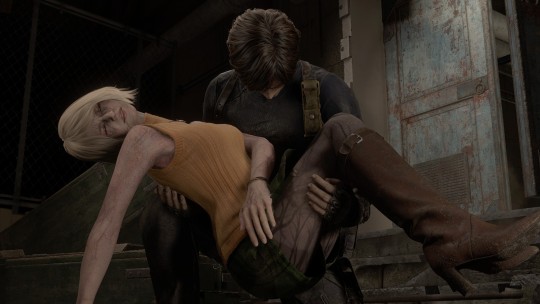

This narrative is then reinforced by overtly romantic imagery, like Leon appearing to Ashley bathed in moonlight, and Ashley wistfully looking to him off towards the horizon, hands clasped to her chest, as embers float around her like fireflies.
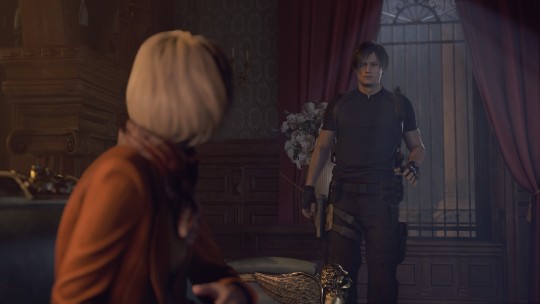
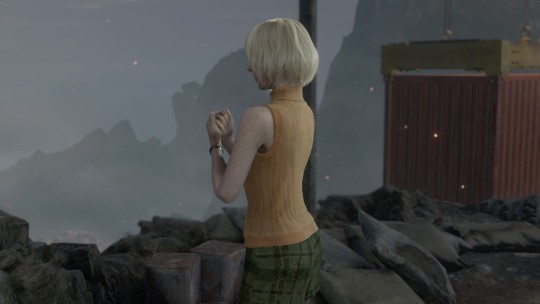
It also invokes the imagery of classic romance stories and fairy tales, including:
Several literal princess carries
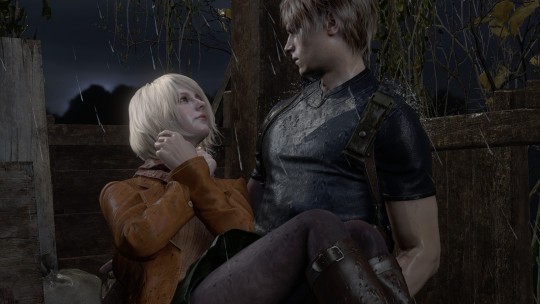
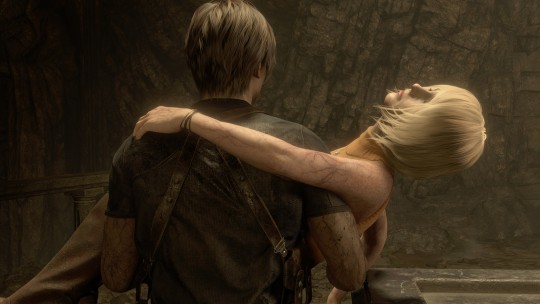
Prince Phillip about to break the spell on Sleeping Beauty with true love's first kiss
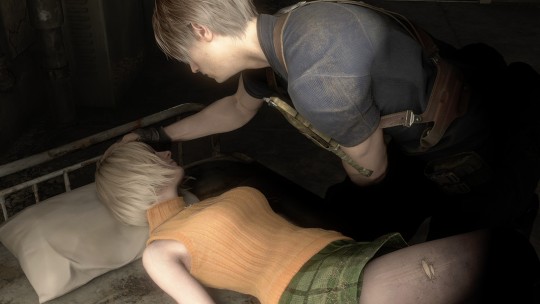
The Prince approaching Snow White's altar
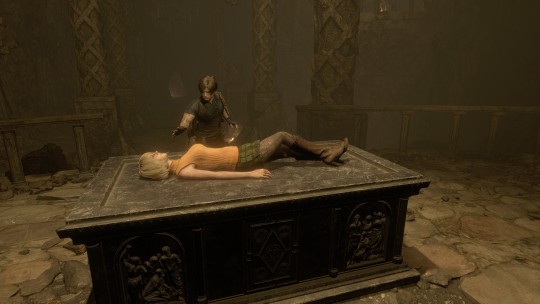
Leon kneeling before Ashley like a knight does his queen
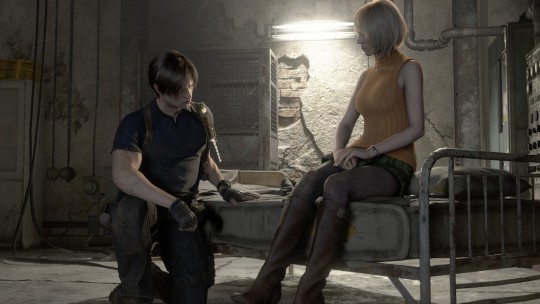
Romeo and Juliet's very famous balcony scene
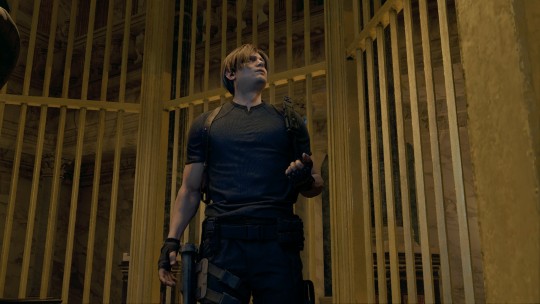
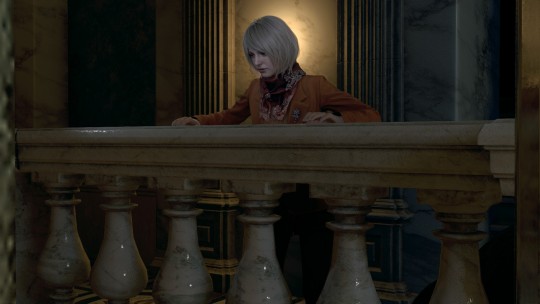
Leon extending a hand to Ashley as though he's asking her to dance, not once but twice
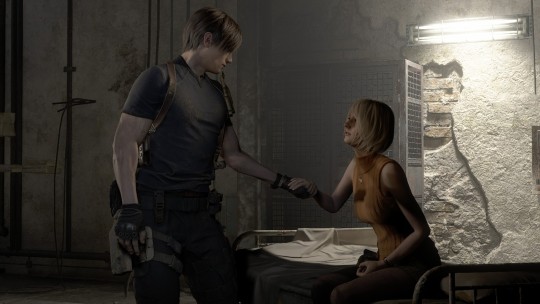
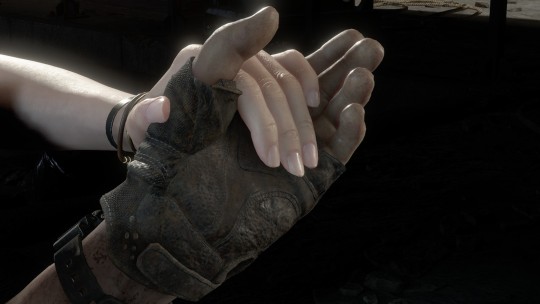
And in case all of that wasn't enough -- if you somehow still didn't catch it, Capcom included a set of matching alternate costumes for Leon and Ashley literally called "Romantic."
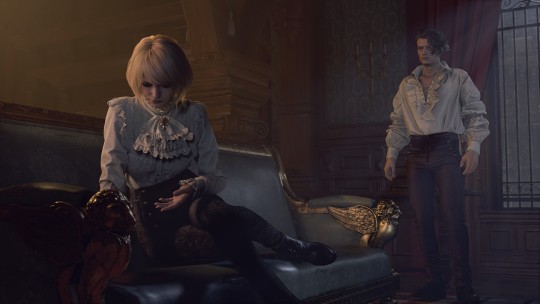
I don't know how much more explicit they could've been about this, short of having a big, sweeping kiss scene -- especially when you consider that absolutely none of the above was present in OG. None of those scenes happen in OG at all.
And this isn't even taking into account that the devs restructured the plot of OG to follow the story outline of a romance novel beat-for-beat -- nor the overt sexual imagery associated with specific lines of dialogue between Leon and Ashley. And even if you ignore the fairy tale aspect all together, Leon and Ashley's relationship is intrinsically tied to the theme of teamwork, and there's a romantic element about how that is portrayed, too.
So, sure. You could look at RE4make as a story about a man who's just doing his job and saves the president's daughter because idk he's a badass and that's just what he does. And he overcomes his trauma about Raccoon City because he actually saved a person's life finally, and it wouldn't have mattered who it was; it just happened to be Ashley.
Sure.
You could.
But you miss the fucking point of what the storyteller(s) were trying to do.
You miss the intention of the developers paying homage to RE4OG being such a huge part of so many people's childhoods by turning the story into a fairy tale.
You miss the parallels of Leon becoming a broken husk of a person because of failing re: Ada, and Leon finding his smile and his kindness again through Ashley.
It leaves you with a shallow story where shit just kind of happens and Leon's a cool dude who overcomes the odds all on his own because he's so cool and strong.
And you'll never be able to convince me that that's how the devs wanted their story to be read. Not with the deliberate layering of themes and imagery and allegory that they've folded into the narrative.
And you'll never convince me that all of this was just a coincidence, either.
Eagleone is canon -- just not canon in the way that most people tend to think of it.
Because the one thing missing from RE4make's fairy tale is that Leon and Ashley don't live happily ever after. They don't end this game a couple, and they'll never be together in the future.
Because while RE4make was a fairy tale, it was the nightmare horror version of one.
And horror stories don't get to have happy endings. That was true for Ethan and Mia in the literal storybook that was RE:Village, and it's true here for Leon and Ashley.
But that doesn't make the romance between these two characters any less real.
#resident evil 4#leon kennedy#ashley graham#eagleone#meta analysis#this might be the most important eagleone post i ever write#i also never thought i'd compare leon and ashley to ethan and mia#but here we are LMAO#hopefully this was worth the almost three hours it took me to make
62 notes
·
View notes
Text
For Writers: Incorporating Esotericism into World-Building
Esotericism refers to a broad category of spiritual, philosophical, and mystical traditions that focus on the pursuit of hidden, inner knowledge that is only accessible to a select few.
In this first post, I'll introduce the basics of esotericism and explore how these concepts work together to create an ongoing cycle of birth, death, and rebirth. We'll also set the stage for exploring these ideas more deeply across different cultures and spiritual traditions.
It is about seeking the deeper truths of the universe, reality, and the self—truths that are often concealed from ordinary perception or common understanding. Esoteric teachings often require initiation, self-discovery, and a certain level of spiritual or intellectual maturity to grasp.
Esoteric traditions typically stand in contrast to exoteric religions, which are the outward, public practices of faith meant for all adherents. While exoteric traditions focus on communal worship, rituals, and scriptures available to everyone, esotericism emphasizes personal, internal experiences and insights, often hidden in symbolism, allegory, or mystical practice.
Esotericism offers a wealth of material for creating complex worlds and characters. Here are a few ways to use esoteric concepts in your writing:
Secret Societies and Mystery Schools: Create organizations in your world that guard hidden knowledge, initiate members into mystical traditions, and use symbols to communicate deep truths. These groups might influence politics, religion, or culture from behind the scenes.
Alchemical Symbolism: Use alchemical symbols and the concept of spiritual transformation to enrich your magic systems or character development. Characters could embark on a metaphorical "great work," transforming themselves spiritually as they pursue physical goals.
Correspondence and Cosmic Connection: Play with the idea of correspondence, where events in one realm reflect events in another. Perhaps the movements of stars dictate the rise and fall of empires, or characters must learn to read cosmic signs to guide their journeys.
Mystical Experiences: Characters could undergo mystical experiences that reveal hidden knowledge or spiritual truths. These visions might guide them on their quests or challenge their understanding of reality.
Key Concepts in Esotericism
Hidden Knowledge (Occult Knowledge) At the heart of esotericism is the belief that hidden truths—often called occult knowledge—exist beneath the surface of everyday experience. This knowledge is believed to offer a deeper understanding of the cosmos, the divine, and the human soul. In many esoteric traditions, discovering this hidden knowledge requires initiation, meditation, or the study of sacred texts. Occult, from the Latin word occultus (meaning "hidden" or "secret"), often refers to knowledge or power that is beyond ordinary human understanding, reserved for those who are spiritually or intellectually prepared to access it.
Initiation and Secrecy Esoteric knowledge is often protected by initiation rites and secrecy. Only those deemed worthy or prepared are allowed to receive the teachings. These secret societies or schools of thought, such as the Freemasons, Rosicrucians, and Hermeticists, practice initiation rituals to induct new members into the more profound mysteries. This is why esotericism is often linked with mystery schools—institutions that taught spiritual and philosophical ideas in secret, using symbolism, ritual, and hidden meaning to communicate their teachings to those ready to understand them.
Correspondence and Analogy One of the guiding principles of esotericism is the idea of correspondence, the belief that everything in the universe is connected and that the microcosm reflects the macrocosm. This is best summarized in the Hermetic maxim: "As above, so below." This idea suggests that everything on the physical plane reflects a higher, spiritual reality, and by understanding one level of existence, we can gain insight into the others. For example, the movements of the planets (macrocosm) can correspond to events in an individual’s life (microcosm).
Alchemy and Transformation Alchemy is one of the most famous esoteric traditions, often misunderstood as simply the quest to turn base metals into gold. In reality, alchemy is a complex system of symbolic and spiritual transformation. The actual "gold" of alchemy is the purification and elevation of the soul. The alchemist seeks material and spiritual perfection through transmutation—breaking down impurities and refining elements. Esoteric alchemy draws on the idea of transforming the self through spiritual growth, much as the alchemist refines metals in the laboratory. This process of personal transformation is a central theme in many esoteric teachings
Astrology and Cosmic Influence Astrology plays a significant role in many esoteric systems, as it is believed that the planets and stars influence not only events on Earth but also the individual soul’s journey. In esoteric thought, astrology is not merely a tool for divination but a system for understanding how the universe influences human experience and consciousness. Esoteric astrology emphasizes the spiritual and psychological meanings behind planetary movements, helping individuals understand their soul's evolution and the lessons they are meant to learn in each incarnation.
Mystical Experience and Direct Revelation Unlike dogmatic religious systems that rely on external authorities (like sacred texts or clergy), esotericism often emphasizes personal mystical experience. The goal is to achieve gnosis, or direct knowledge of the divine, through contemplation, meditation, or other spiritual practices. Mystical experiences in esotericism are seen as moments of direct communion with the divine, allowing the individual to transcend the limitations of ordinary perception and access more profound truths about the nature of reality.
In the next post, we’ll delve into how different spiritual traditions worldwide interpret culture, from Hinduism and Buddhism to Western esoteric traditions like Gnosticism and Theosophy.
Esotericism as a Path to Hidden Truths
Esotericism invites both readers and characters to explore the hidden layers of existence, seeking deeper meaning in the universe and within themselves. Whether through the study of ancient symbols, the pursuit of personal transformation, or the unveiling of cosmic connections, esotericism offers a profound and mystical journey into the unknown.
For writers, it provides a rich framework for crafting stories that explore themystical, the hidden, and the transformative. Whether you’re designing secret societies, crafting magical systems, or delving into character development through spiritual awakening, esoteric concepts can give your narratives depth, intrigue, and a sense of the transcendent.
Esotericism teaches that reality is more than what we see, and by peeling back the layers, both characters and readers can discover truths that are often hidden in plain sight.
#esotericism#world building#writer tips#writer community#writers on tumblr#writerscommunity#writersblr#writeblr#writer#creative writing#queer writers#writing#occultism#mysticism#esoterica#occult#alchemy#spiritual journey#shadow work#symbolism#astrology
27 notes
·
View notes
Text
Joan of Arc study
Last year, I led a small digitial “retreat/study” on Joan of Arc via my Kofi- while my Kofi is no longer running (difficult to keep on top of because of other work obligations), I thought that in honour of her feast day I would make it publicly available. All of the text and resources used are under the cut- you can do this at your own pace, with one topic per week, or any other way you like. It’s to generate personal reflection on gender and one’s relationship to God, and is designed to be completely non-denomination, meaning that while it does use Bible readings, even if you are not a Catholic or a Christian, it should be able to stimulate some thought and reflection without having a definite religious slant.
The topics covered are:
Joan the Warrior
Joan the Androgyne
Joan the Prophet and Mystic
Joan the Disciple
Below the cut you’ll find all of the readings and bonus content for each topic, and at the end are “notes,” a short informal essay consolidating what I’m hoping to share through this study. But I highly encourage you to do your own reflection, be it through journalling, prayer, mediation, or whatever form of self-reflection suits you best, and try to decide what the readings- and Joan herself- says to you.
Ultimately, I hope what you’ll discover through this "retreat" is that our gender identity makes us warriors, prophets, mystics, and disciples- that existing between the binaries imposed on us by patriarchy allows us to draw closer to the strange and wonderful place where God exists.
WEEK 1: Exploring God and Gender with Joan of Arc- Joan the Warrior (readings)
This study pre-supposes that you already have some background on Jehanne and her life- nothing too in-depth, and we'll get into some of the finer points of her life that aren't as popularly known throughout this study. If you'd like more information, I highly recommend Helen Castor's biography and Regine Pernoud's Joan of Arc By Herself and Her Witnesses.
I've mentioned that this is a non-denominational study. What does this mean? Mainly it means that while scripture provides the backbone of a lot of our reading, I don't want us to treat scripture in a Christian context. Rather, I want to treat it primarily as a literary text, and rather than engaging with it as a "Bible study" or theological undertaking, I want to challenge us to read this without any preconceived notions of what it means in a religious context. Rather, read it the way you'd read a novel or short story. How does it make you feel? What themes, motifs, metaphors, allegories, or other literary techniques are employed? What is the text trying to say?
Read:
Judges 4-8: Deborah, Jael, and Gideon
Christine di Pizan's Joan of Arc
excerpts from Jehanne's trial: Joan's Tools
(If you want to read all of Jehanne's trial transcripts, you can do so here- I'll be providing more excerpts over the upcoming weeks, but we won't be reading it in full, so I highly encourage you to read the full transcript on your own if you'd like.)
Consider:
What tools does God give to Deborah and Gideon? Are those tools always weapons? Do they always require public acknowledgement, like Deborah’s tent peg? What tools has God given you? What similarities do you see between the Bible study and Joan? How does Christine di Pizan portray Jehanne in her poem? Is there a similarity between di Pizan's portrayal and the portrayal of the Biblical judges?
Extras:
have a listen of Veni Creator Spiritus- this Latin chant was said to have been sung before every battle by the French army when Jehanne arrived at Orléans on 29 April 1429, legend has it that a choir of priests went before her signing this hymn.
shameless self-plug of my own but much beloved Joan of Arc Spotify playlist
WEEK 2: Exploring God and Gender with Joan of Arc- Joan the Androgyne (readings)
Read:
Judith 8-9
Marina Warner's Joan of Arc: The Image of Female Heroism, Chapter 7: Ideal Androgyne
excerpt's from Jehanne's trial: Jehanne and her gender presentation
Consider:
Last week we considered the tools God gave figures like Jehanne, Gideon, and Deborah. How does Jehanne's gender function as a tool? How does Jehanne view her relationship to gender based on her testimony? How does the idea of her as an androgyne, as opposed to a warrior woman or girl, change your idea of her as a historic figure? How does Jehanne's gender presentation compare to that of Judith?
Extras:
If you haven't seen it already, Carl Dreyer's 1928 masterpiece The Passion of Joan of Arc is available to watch for free on Internet Archive. It is a fascinating, moving, and exceptional portrayal of Jehanne's trial, arguably the best, and it's lead actress Renee Falconetti beautifully captures the idea of Jehanne as the androgyne.
WEEK 2: Exploring God and Gender with Joan of Arc- Joan the Prophet and Mystic
Read:
the Book of Jonah
“Joan of Arc and Female Mysticism” by Anne Llewellyn Barstow
Joan of Arc and her voices
Consider:
Does Jehanne know she is a mystic, a saint, a prophet? What relationship is there between Jehanne's gender and her prophecy? Is Jehanne a true mystic? Why or why not?
WEEK 4: Joan the Disciple
Read:
Luke 8
2 Clement- all if you wish, or just Chapter 12
skim the complete transcript of Jehanne's trial, paying attention to the final day (starting at page 358)
Consider:
Pay special attention to Luke 8: 16-19. How does this apply to Jehanne? More specifically, how does this apply to how she presents her gender. Much criticism in her trial is centered on how she does or does not properly conform to gender. How do these verses, and those in 2 Clement, apply to Jehanne and her treatment by the church?
Bonus:
Jehanne's letters, which are a fascinating look at her voice
Mark Twain's Personal Recollections of Joan of Arc is free to read
Notes:
On April 30, 1429, Joan of Arc- who styled herself Jehanne la Pucelle, or Jehanne the maid- arrived at the French city of Orléans to free it from English control. Orléans had been under siege since October of the previous year: it's commander and French army were exhausted and contemplating surrender.
Enter Jehanne. The story is famous: aged sixteen, she heard the voices of saints and angels commanding her to free France from the English, lift the siege of Orléans, and crown the Dauphin. Remarkably, she succeeded, before being condemned to the stake for heresy by the Church. Her feast day in 30 May.
In our study about Jehanne, we've read portions of Judges. Judges cover a period in Israelite history prior to the establishment of the monarchy of which the famous Davidic monarchy was part. This is a period which roughly corresponds to the historic period 1400–1000 B.C., just after the settlement of Canaan after the Egyptian diaspora, when the Hebrew settlers were living among foreign, polytheistic tribes like the Philistines, who are a major antagonist throughout the narrative. Judges is considered one of the oldest books in the Hebrew bible, with the Song of Deborah- Judges 5- being one of the oldest portions. It documents a tumultuous and frequently violently history marked by agronomic destruction of a society attempting to rebuild after four centuries of indentured servitude to a foreign power, and a struggle to maintain the monotheistic practices which developed in the wake of their diaspora- the Levitical priesthood which we now know as Judaism.
There's a similarity between this era of Israelite history and that which would have been experienced by Jehanne at the time of her call. Jehanne was born in 1412 a working-class peasant girl from Domrémy in the Lorraine region of France. This location was almost directly on the border between French-held lands and those which had been invaded by the English during the course of the Hundred Years' War, which had already been going on since 1337. She was around thirteen years old when she first heard what she described as "voices," in 1425; it was the year that war is first documented to have begun directly affecting her home region, with raids by English or English-back French mercenaries taking place near Domrémy in 1425 and 1428. In once incident the village's cattle were stolen, and in another the town was set on fire and crops destroyed. It isn't difficult to see a similarity between what Jehanne may have felt about her circumstances and that of Gideon:
Gideon answered him, “But sir, if the Lord is with us, why then has all this happened to us? (Judges 6:13)
In the midst of this, Jehanne experienced her first vision- in her father's garden, a voice she identified as Saint Michael the Archangel (a high-ranking angel figure known as the protector of the Jewish nation and later of Christians).
By 1428, Jehanne had apparently begun to formulate what she was being asked to do by her voices, whom she had by then identified as Saint Catherine and Saint Margaret- two early Christian martyrs- in addition to Saint Michael. After being accused of breaking an engagement (a case dismissed by the ecclesiastical court at Tours, but which rather darkly foreshadows the way in which her later trial and execution would inherently punish a wayward "woman"), she became convinced that her voices were telling her to leave Domrémy to aid the Dauphin. It was a remarkable undertaking for a sixteen-year-old peasant girl, illiterate, who had never left her home village. By February of 1428, she had convinced a local nobleman to support her and conduct her to the Dauphin's seat at Chinon. It was at this time that she began to wear men's clothing- an outfit which was provided to her by the local townspeople, and rather famously consisted of a pair of breeches which tied to her jerkin, a costume which made her almost- but not entirely- invulnerable to rape. Like Deborah and Jael, she was endangering herself by entering a world that was dominated by men, and her choice of clothing is evidence of this.
And like the judges we have read about, Jehanne was called from her home village in a period of turmoil to perform what she saw as a sacred duty, something which God had commanded her to do. Like Deborah, she was something of a prophet: she knew that she would see the Dauphin crowned king of France:
And she said, “I will surely go with you; nevertheless, the road on which you are going will not lead to your glory, for the Lord will sell Sisera into the hand of a woman.” (Judges 4:9)
And, like Gideon, she was a working-class farmer called on to lead an army.
He responded, “But sir, how can I deliver Israel? My clan is the weakest in Manasseh, and I am the least in my family.” The Lord said to him, “But I will be with you, and you shall strike down the Midianites, every one of them.” (Judges 6:15-16)
I think these similarities are all the more important this week, as we face the destruction of reproductive rights under Roe vs. Wade and the ongoing victimization of victims of domestic violence. Too frequently Biblical womanhood is cited as an excuse to strip people who are not cishet men of their destiny- to relinquish them to a common denominator, a life of submission and servitude. But what Judges shows us is that God’s call does not discriminate between bodies or genders. A person’s place in the world is wherever God calls them to go. We are allowed to ask for God’s reassurance of his call, but we must remember that if God calls us, he trusts us. We must trust him, and trust ourselves as he justifies us. God’s purpose supersedes the binaries and restraints imposed on us by the world.
Too often we equate "warriorhood" with masculinity, dominance, and activeness. Among Christians the epitome of being a warrior is archetypically defined as avenging angels and violent crusaders, many of whom committed gross atrocities and whose actions characterize a far-right movement of alleged "God-fearing" men who believe in their divine right to power on account of their maleness. Gross and extreme conservatism characterizes much of the front-facing presence of Christianity, it is this fundamentalism which we now see strongly affects political process. But God does not pick warriors from the strongest of his believers. David was the youngest son of Jesse. Gideon too. Deborah and Jael were women. God's warriors are those who listen to him: their strength lies in their difference. Consider how you are a warrior- not how you can be one, but how you already are one. Your God-given difference is your destiny: what makes you strong and extraordinary. How does your difference make you a warrior?
Last summer, I took a course on understanding scripture through how it is depicted in art. One week was completely devoted to paintings of Judith and Deborah, and we were assigned to read portions of both Judges and Judith. Funnily enough, we all struggled to tell the difference between depictions of the two women. Unlike Judges, the book of Judith is considered deuterocanonical, and it is not included in the Protestant canon: this could be part of why paintings of Judith and Deborah are frequently confused. But you can always tell the difference between the two in a very simple way. If it’s a woman beheading a man, it’s Judith. If it’s a woman with a hammer, it’s Deborah.
Both depictions of these warrior-prophet-women are marked by the violence of the acts they carry out at God’s call. They are associated heavily with the weapons with which they carry those acts out. It’s a very different image of women than we often associate with Biblical womanhood. Biblical womanhood is frequently associated with attributes like mildness, compliance, domesticity, motherhood, and submission. Biblical and traditional womanhood have become synonymous and conservative. It is heavily binarized, and placed firmly below dominant patriarchal structures.
Yet this view of “Biblical womanhood” doesn’t really hold up to the women we have encountered in the Bible- and it doesn’t hold up with our understanding of Jehanne. A question I want us to ponder this week is what actually constitutes Biblical womanhood? It’s a question that’s going to follow us as we continue this month-long study. Jehanne was condemned to death on account of not being a “real” woman. She was fully equipped to carry out what God asked of her, but she was still condemned for not being the "right" kind of person for her gender presentation.
I would argue that part of her equipment was the fact that she was someone who existed between genders, neither male nor female. But Jehanne was also both male and female. We have words for this now- nonbinary, gender non-conforming, transgender, and many others- but I don't think they help us much when we try and understand the complexity of gender in a time when gender was binary. Yet Jehanne shows evidence that she understood her gender as being other. Her trial transcripts reveal that she attributed no real gender alignment to herself or her presentation: her clothes were chosen for practicality, and that was necessary to fulfill the destiny which she felt had been given her.
How does our gender and our gender presentation function as a tool for our god-given purpose? For many people gender presentation is a tool that helps them to feel more comfortable in their own bodies, to convey to the world who they are. It is a tool that can heal one's relationship to their gender. Our purpose, our fate for which we are given "tools" does not have to be as grand as saving France or the world: it can simply be something intended to save ourselves. Sometimes saving oneself is the greatest mission God gave us- something we are given through his deep love for us.
257 notes
·
View notes
Text
Welcome!
@ryin-silverfish here, also known as "That person who talks a lot about FSYY and fox spirits".
This is my little LMK AU sideblog, which started off as a bunch of disjointed background notes for my fanfics, but developed into its own gigantic thing over time.
I've said elsewhere that, despite LMK (and many other JTTW adjacent works) lifting certain tidbits wholesale from FSYY——like Nezha's backstory or the Golden Dragon Shears, neither the show nor the fanworks really go into the implications of a FSYY/JTTW combined universe.
(For one, Zhao Gongming's three sisters, the Sanxiao, showing up to kick Jin and Yin's butts for stealing and breaking their treasure would be very satisfying, and also hella badass.)
Well, be the change you want, they said.
So here it is: Journey of the Gods, aka "LMK, but FSYY is also canon and an extremely influential historical event".
Inspired by @digitaldoeslmk 's By the Book AU.
What even is FSYY?
"Ancient China's bloodiest bureaucracy recruitment program, kickstarted by a king who simped too hard for the creator goddess of humanity and the fox girl she sent to end his dynasty."
"I'll write my own God-Demon novel, with blackjacks and fox hookers and no Buddhist allegories!" ——Xu Zhonglin/Lu Xixing/Li Yunxiang
Okay, jokes aside: Investiture of the Gods(Fengshen Yanyi) is the other big "God-Demon Novel" of the Ming dynasty, written after JTTW. It's about the toppling of the Shang dynasty and its tyrannical King Zhou by King Wu of Zhou——but with more Daoism, immortals and demons helping out both sides, and ten billion magical formations and treasures.
At the end of the story, almost everyone who died in battle were deified and became the 365 gods of the Celestial Bureaucracy, thus "Investiture of the Gods".
Here is a link to the only full English translation of FSYY, by Gui Zhizhong.
Here is my overview of FSYY's grand overarching conflict, a.k.a. "Why are all the Daoist immortals fighting?"
Compared to JTTW, it's a lot more formulaic and suffers from a massive character count inflation problem, but also extremely influential in Chinese folk religion, to the point of some modern temples, like Qingyang Palace, basically worshiping characters from the novel! Like, the western equivalent would be a church worshiping Dante and Beatrice from the Divine Comedy.
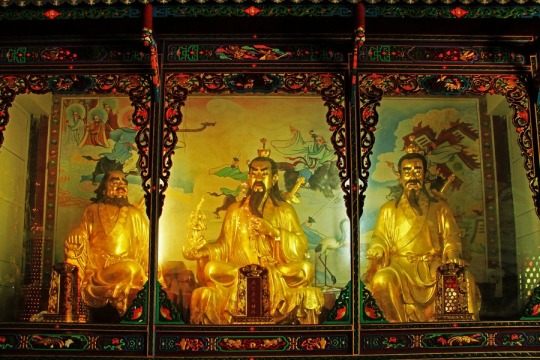
(Similarly, it is to orthodox Daoism what the Divine Comedy is to medieval Christian theology, and should not be treated as actual religious scriptures.)
Okay, FSYY happened in the LMK universe. So What?
Well, first, it will really do wonders to fill up that eerily empty Celestial Realm we see in the Spider Queen special, and the Celestial Bureaucracy will no longer consist of a grand total of five people.
Secondly, it can solve some major show-not-tell problems and actually give legitimacy to the grievances of the LMK Brotherhood + Havoc in Heaven, as well as fleshing out the Celestial Realm.
Third, so many cool magical treasures.
Fourth, LBD gets an origin story, with a twist.
Fifth, I delight in quality angst and horror, and FSYY had some seriously messed-up stuff and implications.
Sixth, Celestial Bureaucracy office politics.
Seventh, Nezha kicking asses and winning fights like he should.
Eighth, crazy Xianxia shit, as you’d expect from the great-granddaddy of modern Xianxia genre.
Ninth, infodumps about Chinese mythos and history trivias.
Tenth, Underworld lore.
...As you can probably tell, this is mostly just me nerding out and writing walls of texts. I'm not a very good artist and can't do Lego style, but will probably doodle some symbol/character designs for funsies.
I also derive most of my enjoyment from writing fix-its and worldbuilding, not shipping characters. Like, I love exploring individual characters through relationships, but just ain't a fan of romance.
There will be a lot of OCs, but unless otherwise specified, all of them will be based on actual characters from FSYY and JTTW, with a few folk gods sprinkled in for funsies.
With that taken care of: good luck and happy reading!
33 notes
·
View notes
Note
I don’t mind taylor swift (although my mom’s convinced she’s a satanic worshiper, well according to her all the secular musicians/actors are so at least she’s consistent)
I actually liked some of the songs on TTPD but I wasn’t comfortable with the religious imagery she uses, at times it felt mocking
LOL, consistency is all I ask!
What a person is comfortable with is what they're comfortable with, and I'm certainly not advocating FOR Christians to listen to Taylor Swift--I think that's a matter of individual conviction. I'm not much of a TSwift listener for a variety of reasons not limited to her terrible worldview and frequent strong language. Nor do I think Christians should be naive when it comes to the secular, which hates God and His people.
That said, I want to invite everyone into my world of music. When I was a teenager, I created a playlist called Sense of the Divine, a phrase which I borrowed from a talk given by Vic Mignogna, but which refers to a concept I was raised from infancy to hold close: Humans are made to glorify God and enjoy Him forever, and every human knows this.
My Sense of the Divine playlist included artists such as OneRepublic, Tonight Alive, Bastille, Bear's Den, and Panic! At The Disco, with lyrics such as:

and

and

(This is one of my favorite lines of all time.)
But eventually, I stopped adding to that playlist, because 80% of all music I now listen to contains some kind of religious language, imagery, allusions, illustrations, allegories, etc. Any time I am listening to music, I am thinking on spiritual realities: how are God and man conceptualized correctly and incorrectly in this song and by the artist? How have I encountered those misconceptions in my own life? My own heart? Where do they come from? How do they affect us? How can they be defeated? Oftentimes, I'm asking, "How can I recontextualize this line in a way that is theologically correct?"; "How does this correspond with the themes of X Story?"; "How does this correspond with the themes in my WIP?"
If this sounds tedious to you, it's just second nature to me, like breathing. From childhood, my parents always asked us spiritual & worldview questions after any secular movie we watched or book we read, and yes, many songs we heard. I guess I've always assumed all Christians engage with media this way out of necessity, the only other option being to disengage with all media not written or distributed by Angel Studios.
Am I saying all Christians are equipped to regularly take in theologically questionable or downright incorrect content? No, certainly not. The discernment we receive from Scripture is a prerequisite, and I do draw the line for myself in some instances. But I feel it would be a safe bet that what most Christians miss in overtly religious poesy, they make up for tenfold in the covert philosophical assumptions (materialism, existentialism, nihilism, gnosticism, mysticism, scientism, etc.) found everywhere else, and which are arguably much more damaging to our relationship with God.
#(anon don't think I'm directing all of this at you it is more of a general PSA)#on a secondary level listening to overtly religious ideas in music is a great reminder that Western civilization was built on Christianity#it is still inspiring art like it did Milton and Shakespeare and Dante and Steinbeck#the artists can hate us but they still have to give us air time to do it#analysis#x#Christianity
32 notes
·
View notes
Text
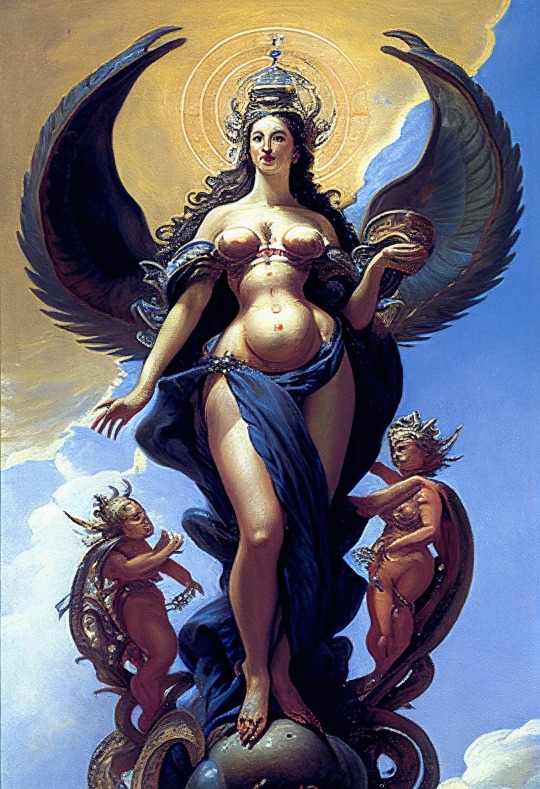
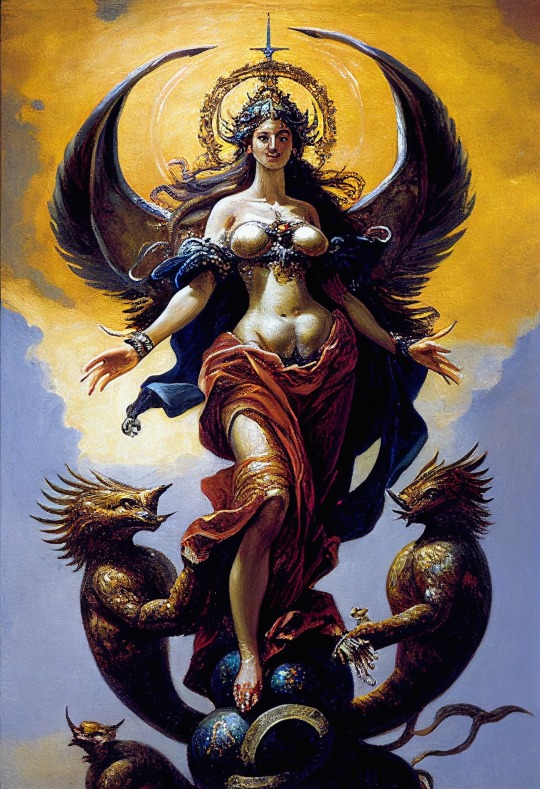
The Goddess Sophia Talon Abraxas
“Allegory of Divine Wisdom”
In Gnosticism, the “Fall” didn’t occur through Adam and Eve – it happened before the world’s creation, through a mistake made by a heavenly being called Sophia (whose name is Greek for “Wisdom.”
The story of Sophia’s fall (which was part of the Gnostic creation myth) is told slightly differently in the many Gnostic texts that discuss it, but the various versions of the tale all share the basics in common.
Sophia was one of the “aeons” – divine entities who were descended from God the Father and who were roughly equivalent to angels. Of the many aeons, Sophia was the last to arise from God.
Like the other aeons, Sophia was the child of a male-female pair of aeons that had come before her, who had given birth with the Father’s blessing. Sophia and the rest of the aeons formed the “Pleroma” (Greek for “Fullness”), the Gnostic name for Heaven.
Sophia wanted to have a child, too. But she went about it in the wrong way: she conceived without the involvement of her male partner or the approval of the Father. Her child was the “demiurge,” a misshapen, belligerent creature that was utterly unlike the other heavenly beings.
Sophia immediately realized her horrible mistake and cast her child out of the Pleroma. The demiurge, now alone, believed that he was the only being who had ever existed, and created the material world out of his ignorance, foolishness, and malevolence, trapping sparks of divinity within Adam and Eve along the way.
Because of her fall and its dire consequences, Sophia became a flawed being. Her deficiency rendered her unable to remain in the perfect “Fullness” of the Pleroma, so she was placed just outside of the Pleroma, in a realm above that of her malevolent son. In anguish, Sophia repented, and the Father agreed to bring her back to the Pleroma once what had become lacking in her was restored to its natural fullness.
Precedents for Sophia in Jewish Literature
In the genre of Jewish (“Old Testament”) writing known as “wisdom literature,” Wisdom (Hokma in Hebrew was personified, and she gave monologues describing her great deeds and articulating her perspective on the world. Since Hokma, like the Greek Sophia, is a feminine noun, Wisdom was cast as a female figure. In the words of Nicola Denzey Lewis, Wisdom is “God’s active feminine principle, at once a part of God but also separate from God,” as in Proverbs 8, Job 28, and Sirach 24. In this regard, she’s much like the Gnostic aeons, who are also semi-independent extensions of God. They act, whereas God himself simply is.
Here’s an example of one of Wisdom’s monologues, Proverbs 8:22-31:
The Lord created me at the beginning of his work, the first of his acts of long ago. Ages ago I was set up, at the first, before the beginning of the earth. When there were no depths I was brought forth, when there were no springs abounding with water. Before the mountains had been shaped, before the hills, I was brought forth— when he had not yet made earth and fields, or the world’s first bits of soil. When he established the heavens, I was there, when he drew a circle on the face of the deep, when he made firm the skies above, when he established the fountains of the deep, when he assigned to the sea its limit, so that the waters might not transgress his command, when he marked out the foundations of the earth, then I was beside him, like a master worker; and I was daily his delight, rejoicing before him always, rejoicing in his inhabited world and delighting in the human race.
The Gnostic depiction of Sophia was surely heavily influenced by this earlier Jewish depiction of Wisdom, both directly and indirectly through the works of thinkers such as Philo of Alexandria, a first-century Jewish intellectual who worked personified Wisdom into a rationalized cosmological system that sought to synthesize and harmonize the Jewish scriptures with the works of Plato, another importance influence on the Gnostics and early Christians more generally.
Sophia and Non-Gnostic Christians
Some texts from the Valentinian school of Gnosticism connect the story of Sophia’s fall to the fate of non-Gnostic Christians – that is, Christians who have the baseline Christian virtue of faith but not the higher mystical insight of gnosis, the root of the word Gnostic.
For these Valentinians, those with gnosis will ascend to the Pleroma after their deaths to partake of its perfect “Fullness.” Christians without gnosis will still be saved, but will have to spend some time in the place where Sophia was put after her fall, so that they, like her, can continue to advance in perfection until they’re worthy of being admitted to the Pleroma. You could say that Sophia’s realm is much like Purgatory in this view.
The existence of Sophia’s celestial waiting room of sorts enabled these Valentinians to have their cake and eat it, too: to preserve the special privilege that they believed gnosis imparted to them, while nevertheless being able to reassure other Christians that they, too, would ultimately be saved. This was surely a socially advantageous view, since it placed the Valentinians within the wider Christian fold rather than apart from it.
35 notes
·
View notes
Note
Is it possible to being pagan, believe in Gods, do practice etc but don't believe in myths? And also what do u think about Ragnarok?
Yup, you can absolutely be pagan, believe in deities, practice, and not believe the myths. And that's because the myths aren't supposed to be scripture, but cultural allegories.
Ragnarok is the story of the time the gods done fucked up. Our gods aren't paragons; they make mistakes just like we do.
Odin created the conditions for Ragnarok to happen because of the ways he tried to stop it from happening—through aggression, and by doing wrong by other people. But Ragnarok is defined by aggression and doing wrong by other people. The fact Odin missed this, and how he missed this, is the allegorical message behind the whole arc.
It's true that the version of Ragnarok we have is heavily syncretized with Christianity, but it's not the Norse pagan version of the end times, nor is it dispensationalist in nature. Ragnarok already happened because the story is already written...and again, these stories are illustrative in nature as opposed to doctrinal.
174 notes
·
View notes
Text
Micro-essay #08
[I keep missing weeks in my religion class lol. I should have weeks 5 and 7 out soon...]
[context: I have a weekly scripture study assignment for Religion class where I have to explain what scripture study technique I used over the week and stuff. I get a bonus point if I share it with people. so I'm going to share them here!]
This week, I read Autumn, Olives, and the Atonement by Andrew C. Skinner. I was looking to find something that would help me make sense of the allegory of the olive tree in Jacob 5, and this one was not only about the cultural significance of olives, but also about autumn! Seeing as we are in the height of autumn right now, I couldn't NOT read it.
Growing up, I remember hearing my parents complain about the allegory of the olive tree -- that it was the longest chapter in the Book of Mormon, that it didn't make sense, and generally that it was less valuable than its surrounding content. From the reading I chose this week, I've begun to understand the opposite -- that olives were fundamental aspects of Jewish faith, ancient culture, and life in general. Olives were a valuable resource, and using olives as an allegory woul have made a lot of sense back then.
So, before rereading Jacob 5, I decided to try to put myself in the shoes of the ancient Jews. The olive tree was known as the "tree of life" or the "tree of light" -- something that resonates with me. Seeing the olive tree as the Tree of Life from Lehi's vision helped me understand the importance others would have placed on it. Every part of the olive tree was used in the ancient days, from the fruit to the branches to the pits to the leaves -- it was central to their culture and function of society as a whole.
Understanding the importance of the olive tree in ancient culture helped me understand the importance of Jacob 5 in my life.
11 notes
·
View notes
Text
I feel like Philip is fundamentally someone who dislikes people and then looks for some deeper moral justification, rather than the other way around. Because as the Titan says, Philip isn’t genuine; He’s someone who only believes in his delusion to be the hero.
Some stranger named Evelyn shows up? Philip hates her and when he finds out she’s a witch, he latches onto THAT explanation to justify why he wanted her dead; It’s because Evelyn was an evil witch! Not because she took time with his brother Caleb, whom Philip felt entitled towards, away from him.
Philip HAS to be right, he HAS to have the moral high ground whenever he dislikes a person; He can’t accept that he’s in the wrong, or even that neither party is wrong, they just don’t gel with each other! Because he has to be the hero. The vindication that Evelyn was secretly an evil witch, because everyone who disagrees with him is secretly evil, was something Philip latched onto for the rest of his life.
Oh, Lilith broke his nose? It’s because she’s an evil, selfish witch! Not because Philip lied to and endangered Lilith and her niece Luz or anything! This world doesn’t bend over backwards for him? It’s because they’re evil. It’s a convenient excuse that makes Philip feel good, rather than something as mundane as “I just don’t like them.” Or “They just don’t like me.” Or even “I have to put in the work to convince them to like me, and even then I can’t actually force it.” Because that isn’t noble and grand enough for Mr. Hero Complex.
It feels like a Chicken or the Egg situation, with how people discuss whether Philip was informed first by his belief in Puritan scripture, which then informed his hatred, or the other way around. Me, I see it as the other way around, and I think it makes the most sense with what we see in canon, and who Philip is an allegory for (or rather, straight-up example of). He’s every Right-Wing Christian who selectively interprets the Bible to justify his hatred of queer people, while ignoring basically everything else about it; Because he isn’t being informed by the actual Bible, Philip isn’t making neutral observations and drawing together a conclusion!
He’s already decided upon a conclusion from the start; That witches are evil. And he selectively looks for stuff that will support this, because he isn’t really a man of science, applying the scientific method. Philip is not a rational person. His own memory photos depict a skewed perception of Caleb as a happy older brother who was misled; Yet we see in S3 how gaunt and miserable Caleb actually was.
But Philip doesn’t want to admit that Caleb was unhappy and made a decision for his own wellbeing; He’s stripping Caleb of any agency as the ideal older brother who was perfectly content with Gravesfield, basically a simple-minded sheep led astray by a false shepherd! Philip is the one removing nuance from Caleb and his story, suggesting Caleb was merely dazzled by a party trick, and not that he had legitimate problems with Gravesfield that would push him away from it.
Philip can’t comprehend why Caleb wouldn’t choose him, why Caleb would choose anyone or anything else over his brother, it bugs him to no end; Or rather, Philip could easily understand, because he’s excellent at getting into people’s heads and figuring them out to manipulate them.
He just doesn’t WANT to understand why Caleb did that, and so he’ll make copies of him, time and time again, until Philip settles upon a Caleb who provides the answer he wants to hear; That Caleb not only agrees, but will always choose Philip, even over himself. But Philip will never get what he wants, because he doesn’t want Caleb but an idea of him that never actually existed. He doesn’t want a person, just a mindless automaton, basically an Abomination.
He is quite literally haunted by the awareness, deep down, that HE is the one who did something wrong; Hence the ghosts, because Caleb’s opinion mattered the most (even if not much at all), so it’s the one he’s most obsessed with disproving/convincing. This man needs to be told he’s right, either by the brother who supported and raised him, or by fellow human Luz. That’s why he shows Luz and Hunter the truth in his memories, because Philip needs someone to see what he did and agree with him, but they never can because of the very nature of it. He’s so insecure he wants approval from people even as he kills them.
Philip secretly knows he’s the bad guy, so it’s not a matter of realizing it, it’s admitting and changing his actions in response to that, which he’ll never do. He feels judged by Caleb and the Grimwalkers, like a child that’s messed up and is hiding the evidence of his wrongdoing, because he secretly fears some sort of punishment. Because while I don’t consider Philip a true believer, it’s inevitable that he internalized some Puritan ideas about the world.
He’s still a kid whose understanding of morality is informed purely by the Carrot and the Stick, whether he’ll benefit, or whether he’ll be punished; Rather than any deeper attempt to engage with people out of legitimate compassion or understand them, because it all circles around to what happens to Philip at the end of the day. This wouldn’t be so inherently wrong if observed in a child, but the problem is that Philip is a grown man well past his natural lifespan, who never bothered to learn beyond this.
I remember seeing some people point to Philip’s long hair as proof he was an outcast who didn’t fit in, a tragic weirdo indoctrinated by society. But I wonder if it’s more along the lines of… Philip is a hypocrite, who doesn’t actually believe in his society’s norms; He’ll just cherry pick what they say to support his own beliefs. But he makes an exception for himself, like Republicans who push for homophobic legislation, yet are revealed to be homosexual themselves.
Philip isn’t motivated by real principles, just whatever is convenient to him at the moment, because it’s all about him and other people basically don’t really exist; They’re more dolls or NPCs than actual, breathing people with their own perspectives and dreams, just like Philip. As a result, he is every child who sees themselves as the center of the universe, and can’t comprehend why other people wouldn’t prioritize this obvious purpose. He is Luz, King, or the Collector, if they never learned to care about other people or understand their point of view; Instead, they only care about what people can do for them, rather than the people themselves.
164 notes
·
View notes